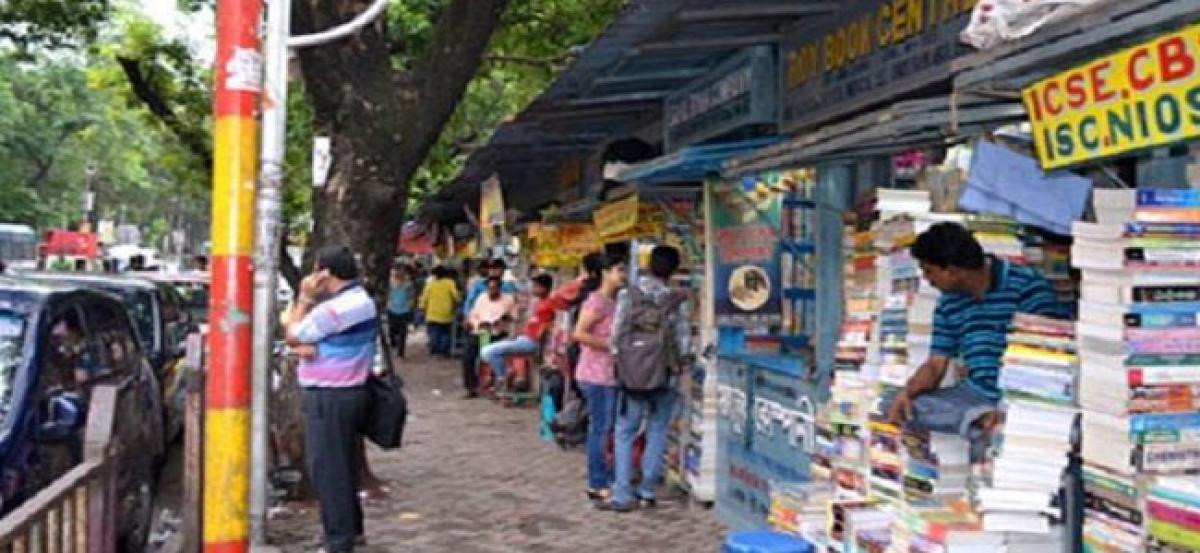Live
- Independent candidate slaps election official
- SC parked Yogi’s bulldozer in garage forever: Akhilesh
- No ‘blame game’ over pollution issue: Mann
- 3 Odisha Police officers get ‘Dakshata’ award
- Punjab To Rebrand Aam Aadmi Clinics Following Central Funding Dispute
- First inscribed ‘Sati Shila’ of Odisha deciphered
- India-China Defence Ministers To Meet Following Historic LAC Disengagement Deal
- NBW against ex-BJD MP, 5 others in tribal murder case
- Combing operations on against Maoists, weapons recovered: HM
- Delhi's winter action plan: Govt to set up 250 tents for homeless individuals
Just In

Bhilar, a small hamlet between the picturesque Panchgani and Mahabaleshwar hill stations in Maharashtra, turned into a paradise for bibliophiles last year after being declared as India\'s first \'village of books\'.
Pune: Bhilar, a small hamlet between the picturesque Panchgani and Mahabaleshwar hill stations in Maharashtra, turned into a paradise for bibliophiles last year after being declared as India's first 'village of books'.
The artistically decorated libraries, spread across the 'Pustakanche Gaav', or the 'village of books', in Satara district are now set to cross the language boundaries and add books of Gujarati, Hindi and English languages to the shelves to cater to the non-Marathi tourists.
The project, launched by the Maharashtra government last year to promote the "culture of reading" and lure tourists, was inspired by Britain's Hay-on-Wye, a Welsh town known for its bookstores and literature festivals.
The concept was mooted by the Marathi Bhasha department and Rajya Marathi Vikas Sanstha, a government body.
"Currently, we have 25 locations in the village displaying Marathi books - ranging from literature, poetry, religion, history, environment, folk literature to biographies and autobiographies," said Balasaheb Bhilare, who hosts a library in a portion of his house.
"However, since Panchgani and Mahabaleshwar are popular tourist spots, a sizable chunk of visitors from Gujarat and north India also come to the village," he said.
A lot of tourists mentioned in their feedback to keep Gujarati, Hindi and English books at the libraries, he said. "So to cater to them, we have decided to increase the locations from 25 to 35 and add approximately 2,000 to 3,000 books from each language to it," he said. Bhilare, who was instrumental in convincing the villagers about the benefit of the project, expressed hope that the addition of books of other languages will increase the footfall of tourists.
Vinay Mavalankar, the book village project in-charge, said state education minister Vinod Tawde is keen to add books of Gujarati, Hindi and English languages in these libraries.
"The books will be selected with the help of literary committees of the respective languages under the Maharashtra government's culture department and soon popular Gujarati, Hindi and English books will be stacked," he said.
Currently, around 25,000 Marathi books pertaining to various genres of literature are available in these libraries.
Dr Jagatanand Bhatkar, the assistant secretary of the Marathi Vishwakosh Centre in the neighbouring Wai town, said apart from boosting tourism, the project's aim was to promote Marathi language, its culture and rich literature.
That is why books from various genres of the Marathi language were kept for reading free of cost, he said.
"Now, since only Marathi books are there, the footfall of Marathi-speaking tourists have increased in the village," said Bhatkar, who is involved in promoting the project.
"In my initial report, I had categorically mentioned that besides Marathi-speaking tourists, a number of Gujarati people frequently visit Mahabaleshwar and Panchgani," he said.
So, in order to cater to the Gujarati and Hindi tourists, the decision of including Gujarati, Hindi and English books has been taken, Bhatkar said. Even foreign tourists come frequently to these hill stations and they too drop in at the libraries, he said.
Earlier, there was no facility for selling these books but now stalls have been opened where tourists can buy them, he added.
Since the launch of the 'book village' project last year, more and more people are coming forward to host free libraries at their homes.
Each of these 25 locations are dedicated to a particular genre of literature and walls of the cottages which house these reading hubs are decorated with literary themes.
The libraries have been set up in such a way that a visitor can easily choose books of his or her interest. For example, if a reader is interested in novels, there is a dedicated spot where he can just walk in and browse through fictional writings.
By Sandip Kolhatkar

© 2024 Hyderabad Media House Limited/The Hans India. All rights reserved. Powered by hocalwire.com







